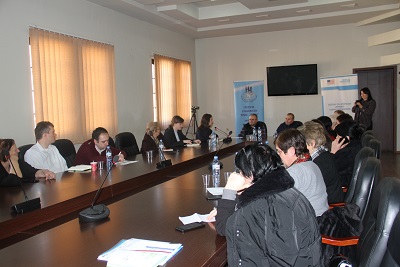Georgia moves forward with localization of National Action Plan on Women, Peace and Security
Date:
UN Women’s Study on the Implementation of UN Security Council Resolution 1325 (2015) recommended that countries with a National Action Plan on Women, Peace and Security (WPS NAP) support and invest in participatory processes, social accountability tools and localization initiatives.

At the national level, monitoring reports produced by the Public Defender’s Office of Georgia and the NGO Women’s Information Center also recommended that the Government of Georgia localize its third WPS NAP (2018-2020).
To act upon these recommendations, UN Women and the U.S. Department of State partnered up with a coalition of three civil society organizations (CSOs) in Georgia - the IDP Women's Association "Consent", the Women's Information Center and the Cultural-Humanitarian Fund "Sukhumi" - to strengthen the capacities of the regional and local administrations in the localization process of the WPS NAP and to enhance the dialogue and participation of internally displaced (IDP) and conflict-affected women and girls. The localization process is being carried out in 10 Georgian municipalities - Dusheti, Gori, Kareli, Kaspi, Khashuri, Sachkhere, Stepantsminda, Tsalenjikha, Tskaltubo and Zugdidi - selected for either their proximity to the administrative boundary lines (ABL) or their high concentration of IDPs.
From 11 to 13 February 2019, consultation meetings organized in the Imereti and Samegrelo regions of Georgia engaged local government representatives from Sachkhere, Tsalenjikha and Zugdidi municipalities, CSOs, grass-roots and IDP women and members of the communities residing along the dividing lines. The discussions focused on the progress of localizing the WPS NAP and on respective security and socioeconomic challenges and needs of the population concerned. Among other human security issues raised were housing and livelihood problems for the IDPs, illegal detentions of people crossing the ABL, human rights abuses and the negative effects of the closure of the crossing points with Abkhazia.
Teona Kardava, an IDP woman living in a collective centre in the village of Kakhati (Zugdidi Municipality, adjacent to the ABL), shared her concerns about the barriers impeding women from participating in decision-making processes: “Women do not have the support to engage in politics, as they have to cope with the existential socioeconomic problems and challenges they face every day.”
Such consultation meetings are being organized in all target municipalities and serve the purpose of linking national policies with local needs and priorities. These participatory platforms increase ownership of the municipalities and of IDP and conflict-affected women in the WPS NAP and contribute to a bottom-up approach to its implementation.